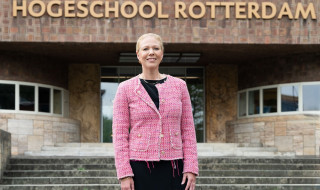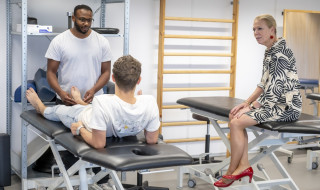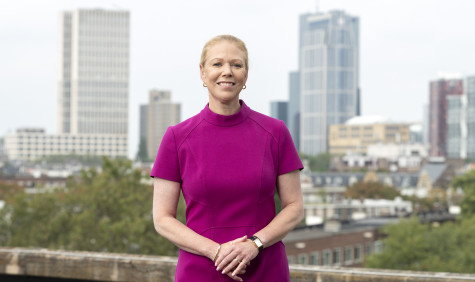"You create support when you let people think with you"
"As a director, I want to show my vulnerable side"
Sarah Wilton-Wels has been chair of the Executive Board of Rotterdam University of Applied Sciences since September this year. The world of education took some getting used to after her career in finance, but now she feels like a fish in Rotterdam's water.
Sarah Wilton-Wels finds the institution "fantastic" and the position she holds there "very honourable". "Rotterdam has been my hometown for almost twenty years. Not only is it nice to cycle to work every now and then, but I can also put my local network to full use for the university. Moreover, I feel the city and its inhabitants well."
With its 40,000 students, 4,000 employees and 15 teaching locations, she sees Hogeschool Rotterdam as a great reflection of the city. "We have relatively many first-generation students, for whom it can be quite tough. That's why we pay a lot of attention to this group within our organisation."
"Next, next, next!"
In 2018, Sarah made the switch from the financial sector to the world of education, becoming director of the economics faculty at Erasmus University. It was a culture shock, she recalls. "I came from structured finance, the ultimate Anglo-Saxon part of a bank, and was used to moving fast and moving firmly. I was working with big targets, based on a large amount of management information."
"In my first months as faculty director, I constantly exclaimed, "next, next, next". While the Anglo-Saxon way of working suits people who are very direct, give their opinions bluntly and want to move on quickly, it also has disadvantages. I liked the fact that once a decision is made, everyone sticks to it and the discussion is closed."

Sarah periodically wondered if she had made the right choice by switching to such a completely different world. "The faculty's administrative secretary said, 'Give yourself one academic year to get used to the teaching world and you won't want to do anything else.' She was right. Because the educational system compared to the banking world is slower in the decision-making process, you connect more with each other. And end up making better-informed decisions that more people can embrace, in my experience by now."
What causes these differences? "In education, the consequences of decisions tend to have long-term effects," Sarah states. "When you turn a knob, it takes much longer to see the effect than in business. Besides, no shareholder is looking at the day's share price. But of course that is my personal impression," she laughs.
Wisdom of the crowd
At Erasmus University and later in her position as a college member of Avans University of applied sciences, Sarah increasingly embraced working according to the Rhineland model. In which leadership is more about serving rather than directing and focused on promoting autonomy and professionalism in the workplace. She is now continuing that at Hogeschool Rotterdam.
"I think in an educational organisation it is very good to let the 'wisdom of the crowd' work. As a director, I want to show my vulnerable side. Seek advice, ask questions, hear the specialist and also dare to follow. Who am I as chair of the board that I would know it all? I just don't think that's realistic. I find that it is much more rewarding if you harness the collective intelligence of staff and students. Moreover, and I think this is also a great advantage of the Rhineland model, you create support when you let people think and participate in decisions."
On one point Sarah remains Anglo-Saxon: "When you have gone through the decision-making process and the vast majority has indicated that this is how we are going to do it, there are always a few people who want to repeat the debate, or simply don't take it up. That rubs me the wrong way. That is why securing agreements and decisions is important to me."
Appreciating our differences
At Hogeschool Rotterdam, Sarah immediately felt like a fish in the water. "In our students and staff, I see so much passion and ambition. It is our challenge to make sure everyone feels welcome and seen. It is therefore important to me that in our policy on diversity and inclusion, we do not make the distinction greater. Emphasise individuality and authenticity, while appreciating our differences. Looking at the other with an open mind. Especially in these times with many complicated debates about the state of the country and the world, this is important, I think. We can learn from each other and respect everyone's opinions in the safe environment of the university."

The chair of the board on a working visit
Hogeschool Rotterdam participates in many initiatives that have a positive impact on the entire city and region. "Take 'Mentors at South', which pairs primary and secondary school students in Rotterdam with committed student mentors. These student mentors coach and guide pupils in homework, career orientation, discovering their talents and choosing an advanced study. Together with Erasmus MC, among others, our university is working to reduce poverty. Something completely different is our participation in Immersive Tech Week, a unique festival at the intersection of creativity, technological innovations, research and art."
Digital and safe
In the coming years, digital transformation is obviously on the institution's strategic agenda. "Digital transformation can make our teaching and research more attractive and student-centric," Sarah explains. "We want students and staff to be able to study and work in a digital and safe landscape. That is why we are investing in digitalisation that strengthens and enriches our teaching, research and our organisation in combination with our existing methodologies."
The college president is keen to note that while embracing digital transformation, she wants to remain true to the public values of her educational organisation. "I recently attended a class on digital humans. What does it mean to interact with a digital human? What if you build a bond with a digital human? Is that desirable, or undesirable? Do we want to expose our students to that? To develop a vision, you have to delve well into a new technology and, above all, not lose sight of the ethical side. We should certainly not close our eyes to it and instead become comfortable with the fact that there are also question marks."
"If I have faith in anything, it is that you have to do what makes your heart beat faster"
The chair is also a mother of two adolescents. What does she wish for her children when they leave secondary school? "Above all, I hope that my 15-year-old daughter and 13-year-old son develop into happy individuals. And that they will do what fits them. I think for now I have a reasonable idea of what is right for them. But by the time they kiss high school goodbye, I'm sure they'll know all too well for themselves. If I have faith in anything, it is that you have to do what makes your heart beat faster. And that is exactly why it is so great to work for and with the young generation. I sincerely hope that Hogeschool Rotterdam can contribute to the development and happiness of its students."
Text: Brigitte Bloem
Photos: Erno Wientjens
